Tianeptine is an atypical tricyclic antidepressant drug most commonly used for treating major depressive disorder. It is also sometimes used to treat anxiety.
The accessibility of tianeptine leads many people to believe that tianeptine is a relatively safe drug. However, tianeptine is not approved by the U.S. Food and Drug Administration and has been associated with numerous health risks and, in some cases, death.
Even though tianeptine has been shown to come with serious risks, it claims to have the ability to treat anxiety, depression, and addiction.
Tianeptine is a unique tricyclic antidepressant.
Tricyclic antidepressants are a class of medications that are used to treat major depressive disorder.
Common street names for tianeptine include:
Tianeptine is sometimes referred to as tianeptine sodium, and it often goes by brand names Coaxil and Stablon.
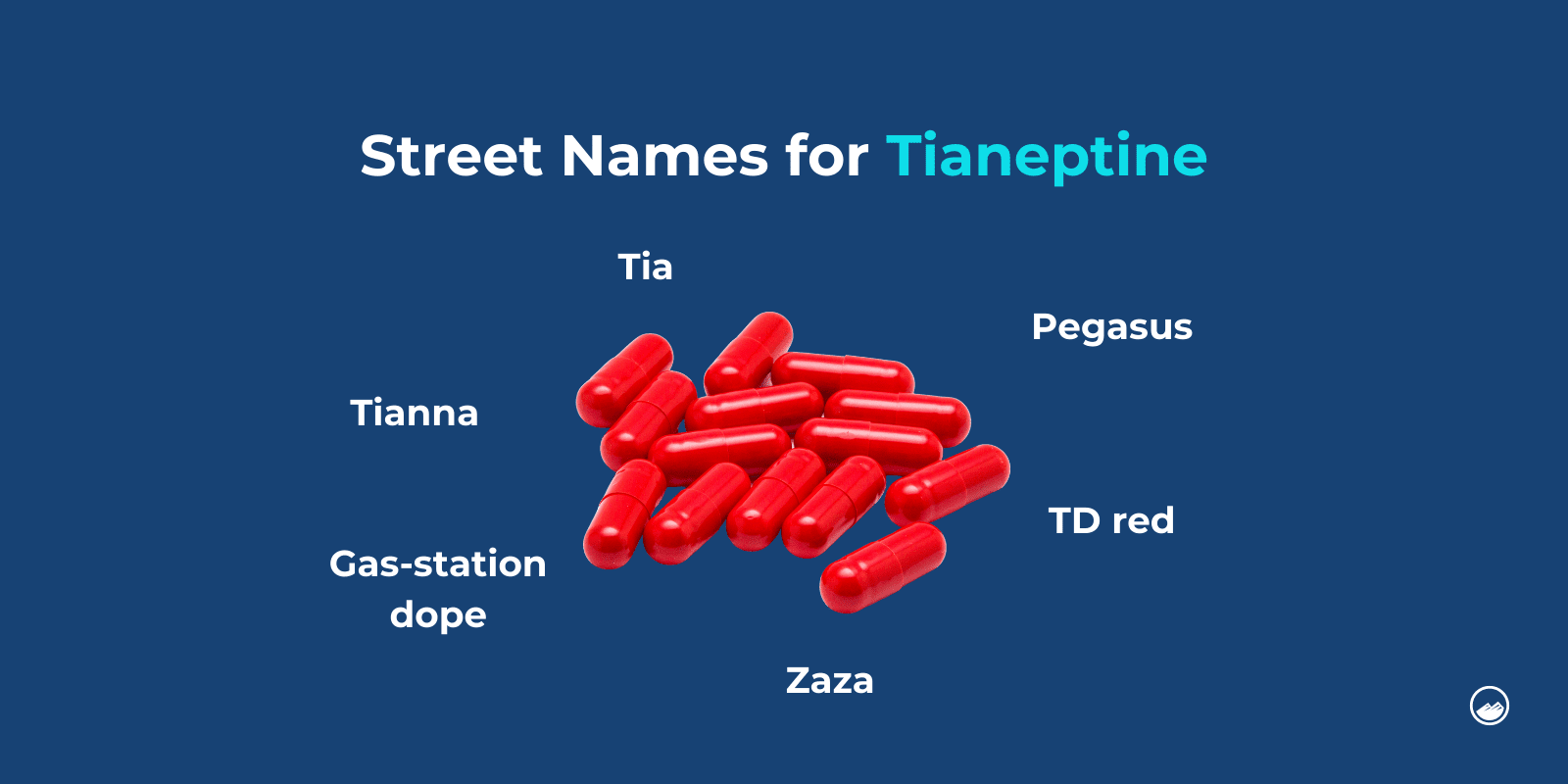
Tianeptine can come in the form of a salt, powder, or pill that may look similar to hydrocodone or oxycodone.
It is also often marketed as a supplement, making it hard for consumers to understand its dangers when it is sold in stores.
In the U.S., tianeptine is not approved for any medical use and has no commercial use.
In some states, tianeptine is considered a Schedule II controlled substance; Schedule II drugs have a high potential for abuse and can lead to severe psychological or physical dependence.
Other schedule II drugs include narcotics like morphine, methadone, oxycodone, and fentanyl.
The drug is banned in certain states, such as Alabama, Tennessee, and Ohio.
Tianeptine is most commonly used in other countries to treat major depressive disorder or anxiety.
However, tianeptine has been abused for its euphoric, opioid-like effects.
People who misuse tianeptine in high doses may be trying to achieve a sense of euphoria and feelings of sedation or trying to numb the pain of difficult feelings and experiences.
In the United States, the Food and Drug Administration has warned people of the dangers of tianeptine and has not approved it for use.
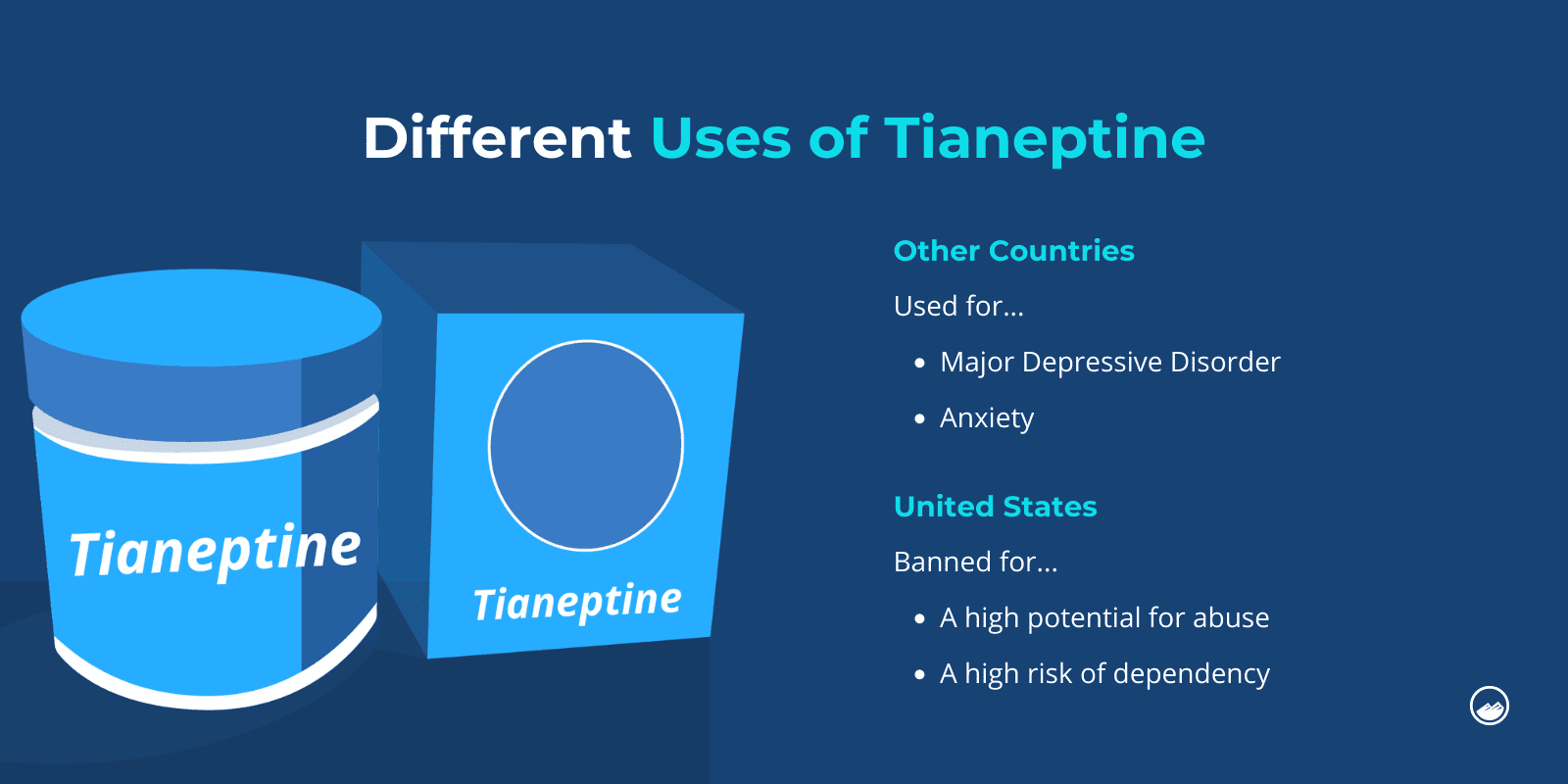
Tianeptine is often abused for its euphoric effects that produce feelings similar to those of opioids.
Tianeptine is compared to opioids because of its strength and its high potential for addiction and abuse.
In the U.S., tianeptine abuse has been increasingly associated with reports of adverse reactions and harmful effects.
The Centers For Disease Control and Prevention explains that many of the health effects of tianeptine imitate those of opioids, including its toxicity, dependence, and withdrawal symptoms.
Additionally, individuals who have previously abused opioids are at a higher risk of developing an addiction to tianeptine.
Some case reports also show that naloxone may serve as an effective treatment for tianeptine toxicity like it is for opioids.
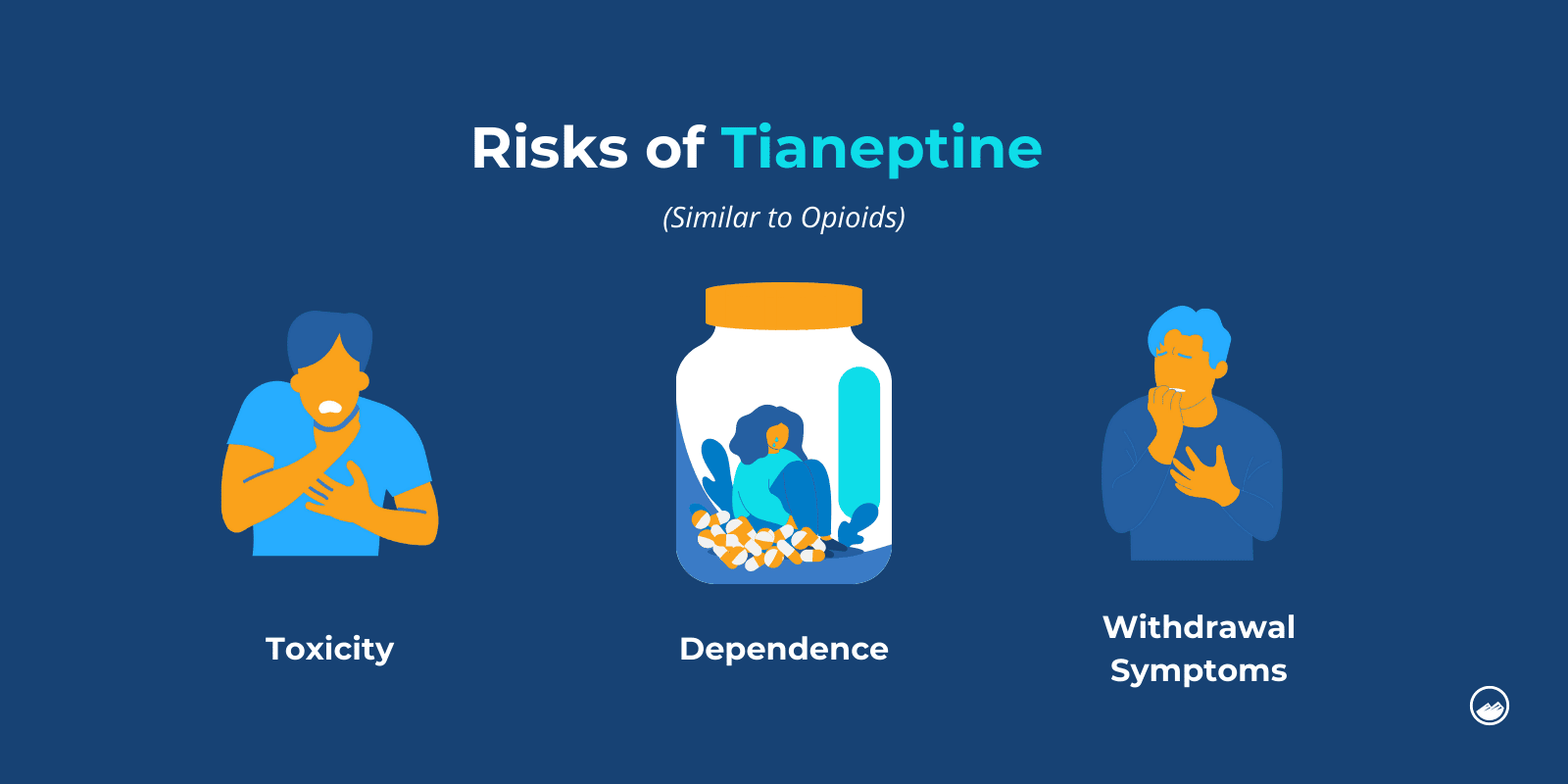
As an antidepressant, tianeptine impacts glutamate receptors in order to increase serotonin uptake in the brain.
While this may seem similar to other selective serotonin reuptake inhibitors (or SSRIs), the safety and efficacy of tianeptine have not been closely examined. It is considered to be an atypical antidepressant and is not approved in the United States.
Tianeptine is similar to some other antidepressant medications, such as amitriptyline, clomipramine, imipramine, and fluoxetine.
When used in high doses, the effects of tianeptine can be similar to those of opioids, along with its high potential for addiction.
Tianeptine is controversial because it is sold in gas stations, often as a dietary supplement, but is unapproved and unregulated in the United States because of its dangerous risks.
According to the FDA, tianeptine is unsafe and should not be used for any reason, including as medication.
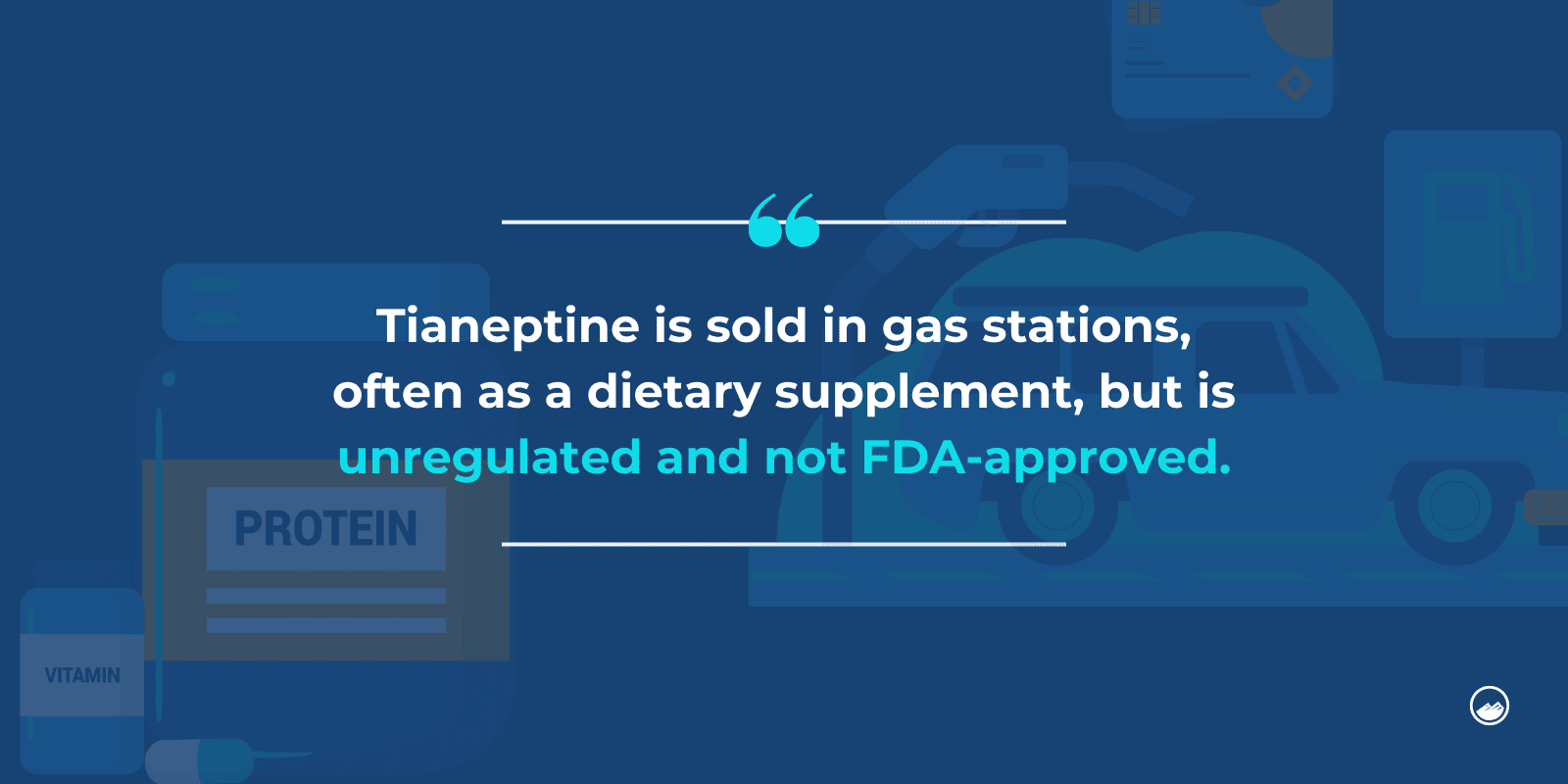
Tianeptine use has been associated with serious negative health effects, including respiratory depression, sedation, and in some cases, fatality.
It has also been shown to have a high potential for abuse and addiction, similar to opioids.
Along with the risk of dependence and addiction, individuals who misuse tianeptine are also at risk of poisoning and overdose.
The adverse effects of tianeptine were most commonly reported to be associated with neurological, cardiovascular, and gastrointestinal symptoms.
Tianeptine is unapproved and unregulated in the U.S. because of the health risks it poses.
The U.S. has not approved tianeptine use because it has been increasingly associated with reports of severe harm, overdose, and fatality.
Because of the increase in reports of adverse effects, harm, overdose, and fatalities associated with tianeptine, the FDA has not approved its use, and it has also been banned in certain states.
The exposure calls to poison control centers related to tianeptine raised flags to the FDA and CDC, indicating a potential public health risk that calls for attention.

Tianeptine is an antidepressant that is used to help manage symptoms of depression.
Antidepressants are often used to improve one’s mood and make one feel calmer and more relaxed.
However, when abused, tianeptine can cause sedative effects that can quickly become dangerous and, in some cases, life-threatening.
Some people misuse tianeptine because they are trying to achieve a sense of euphoria. However, these feelings come with serious effects.
Common side effects of tianeptine, or Zaza, can include:
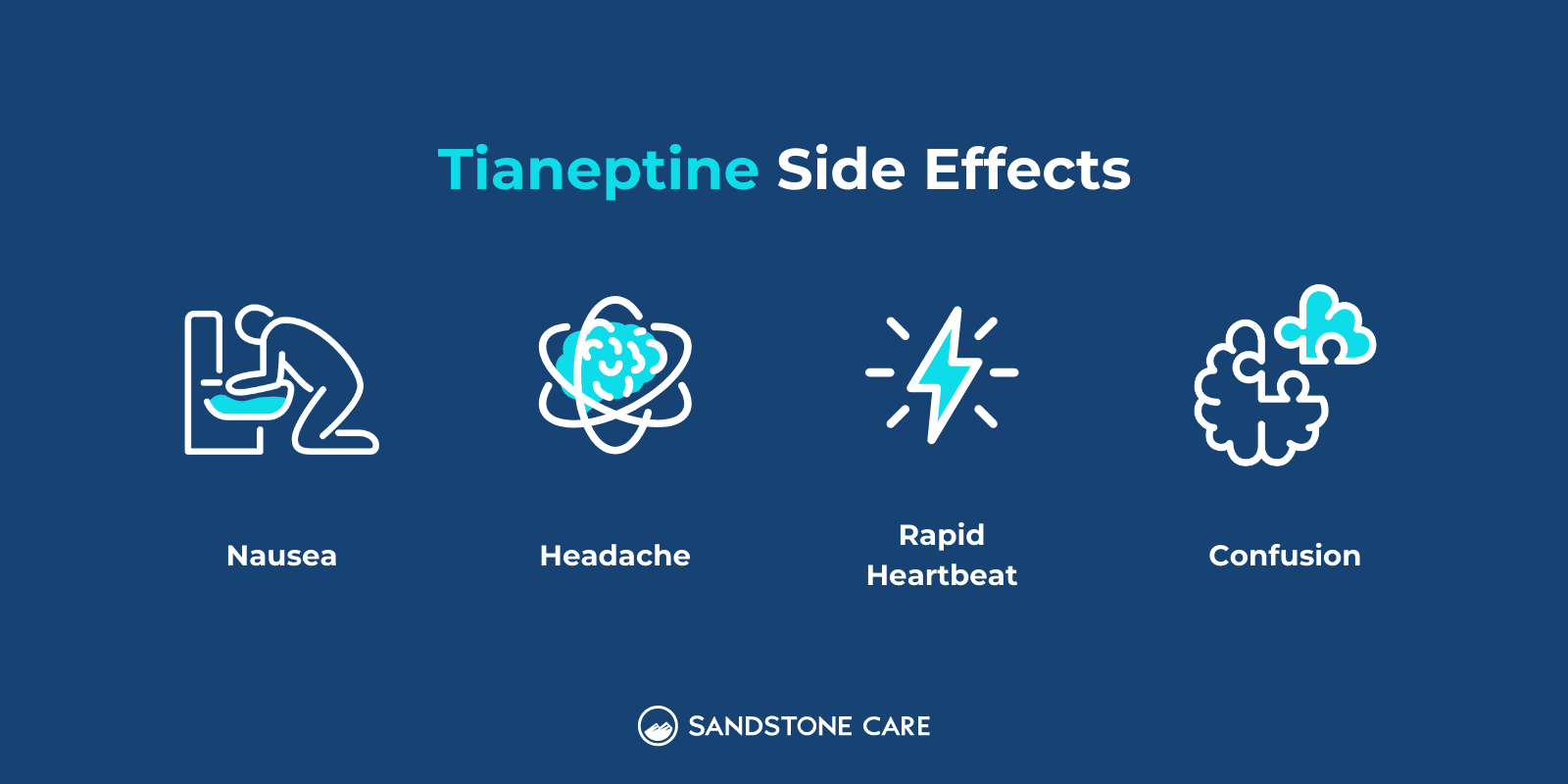
Using tianeptine over a long period of time can lead to serious mental and physical harm and can lead to dependence and addiction.
When a person repeatedly uses tianeptine, they become used to these alterations in both their brain and body, and they start to need more and more of it to feel the same effects, which is also known as tolerance.
Over time, drug tolerance can become a dependence, where the individual will experience withdrawal symptoms if they try to stop using the drug.
An addiction develops when the person has lost the ability to control their drug use and cannot stop despite its negative consequences on their health, life, and well-being.
Substance abuse and addiction can lead to serious mental health problems and lasting physical health problems.
Tianeptine is considered to be a mu- and delta-opioid receptor agonist, meaning it is most often used for chronic pain and depression.
This kind of substance acts on nervous system receptors and opioid systems, which affect functions including pain control, mood, and stress, along with physiological functions such as respiratory, gastrointestinal, and immune systems.
However, tianeptine use can lead to tolerance, dependence, addiction, and other serious harmful effects on the brain and body.
The negative effects of tianeptine on the body often involve neurological, gastrointestinal, and cardiovascular effects.
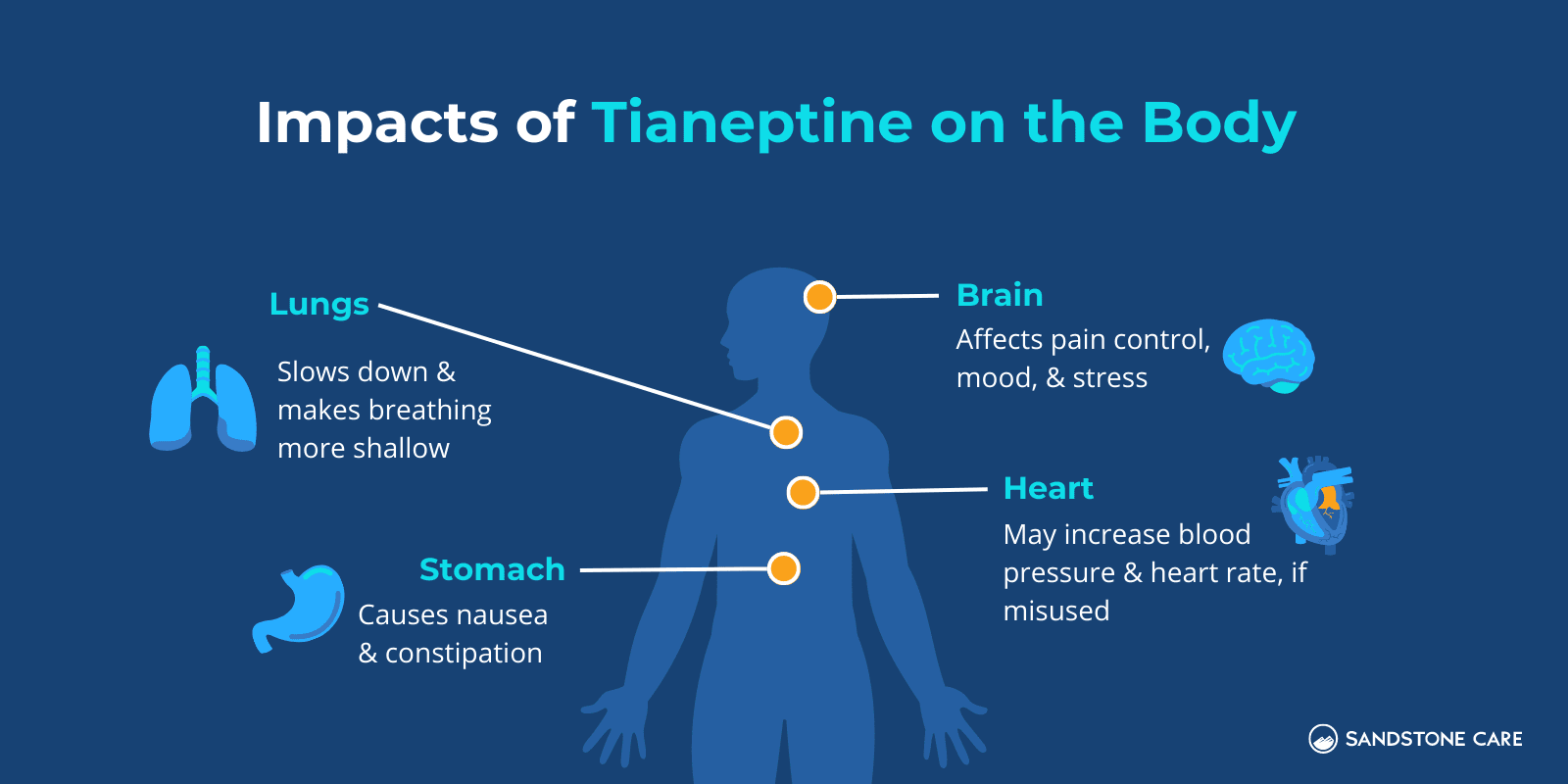
Tianeptine can lead to negative cardiovascular effects.
The effects of tianeptine can cause changes to a person’s blood pressure and heart rate, putting them at risk for severe heart problems such as heart attack and stroke.
Overdose of tianeptine may also cause cardiovascular damage, which can lead to long-lasting, and in some cases, life-threatening problems.
Tianeptine has been shown to have a high potential for addiction, especially when misused for its opioid-like effects.
When a person becomes addicted to tianeptine, they will lose the ability to control their drug use and continue using it despite its negative consequences on their life and health.
Research in the field of psychiatry suggests that individuals who are or have been addicted to opiates are at a higher risk of becoming addicted to tianeptine.
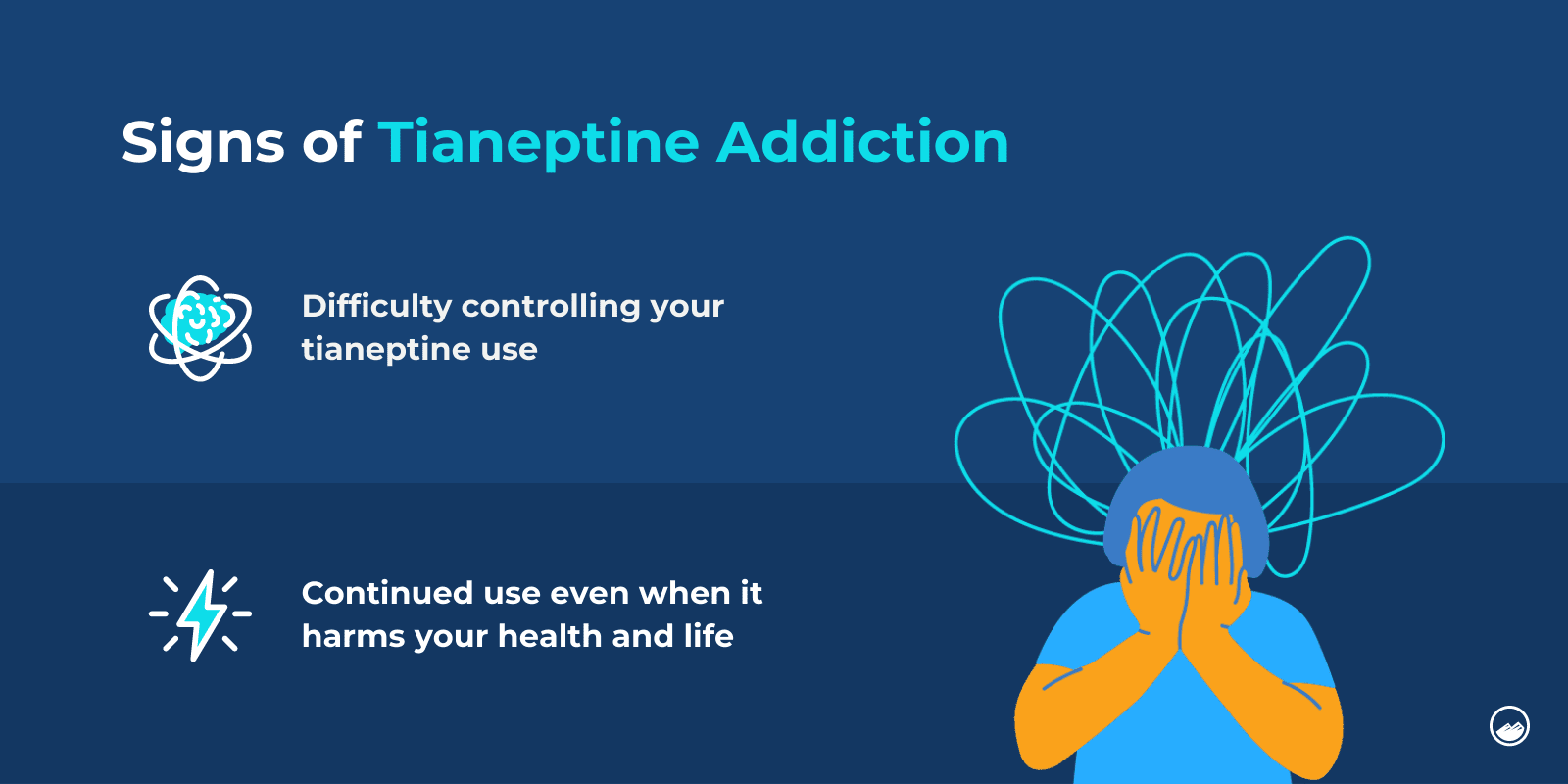
The time it takes for a person to become dependent on a drug and then develop an addiction can be very different from person to person.
The length of time it takes to become addicted to tianeptine can depend on numerous factors, like how often a person uses tianeptine, how high of a dose they take, and their history of substance use.
Tianeptine is not considered to be a safe drug and has a high potential for misuse and addiction.
The FDA warns consumers of the dangers of tianeptine and advises people to avoid any product containing tianeptine.
Taking too much tianeptine can result in serious harm, such as overdose, and in some cases, can be fatal.
Overdose on tianeptine is believed to be similar to that of opioid overdose and withdrawal symptoms.
If you believe someone is overdosing on tianeptine or any other substance, call 911 and get help immediately.
According to the Morbidity and Mortality Weekly Report from the Centers for Disease Control and Prevention, tianeptine overdose fatalities are associated with serum concentrations that range from 4,000 to 18,000 ng/ml.
High doses of tianeptine can lead to serious symptoms such as drowsiness, difficulty breathing, confusion, coma, and in some cases, death.
If you think someone may be overdosing on tianeptine, call 911 immediately and get help.
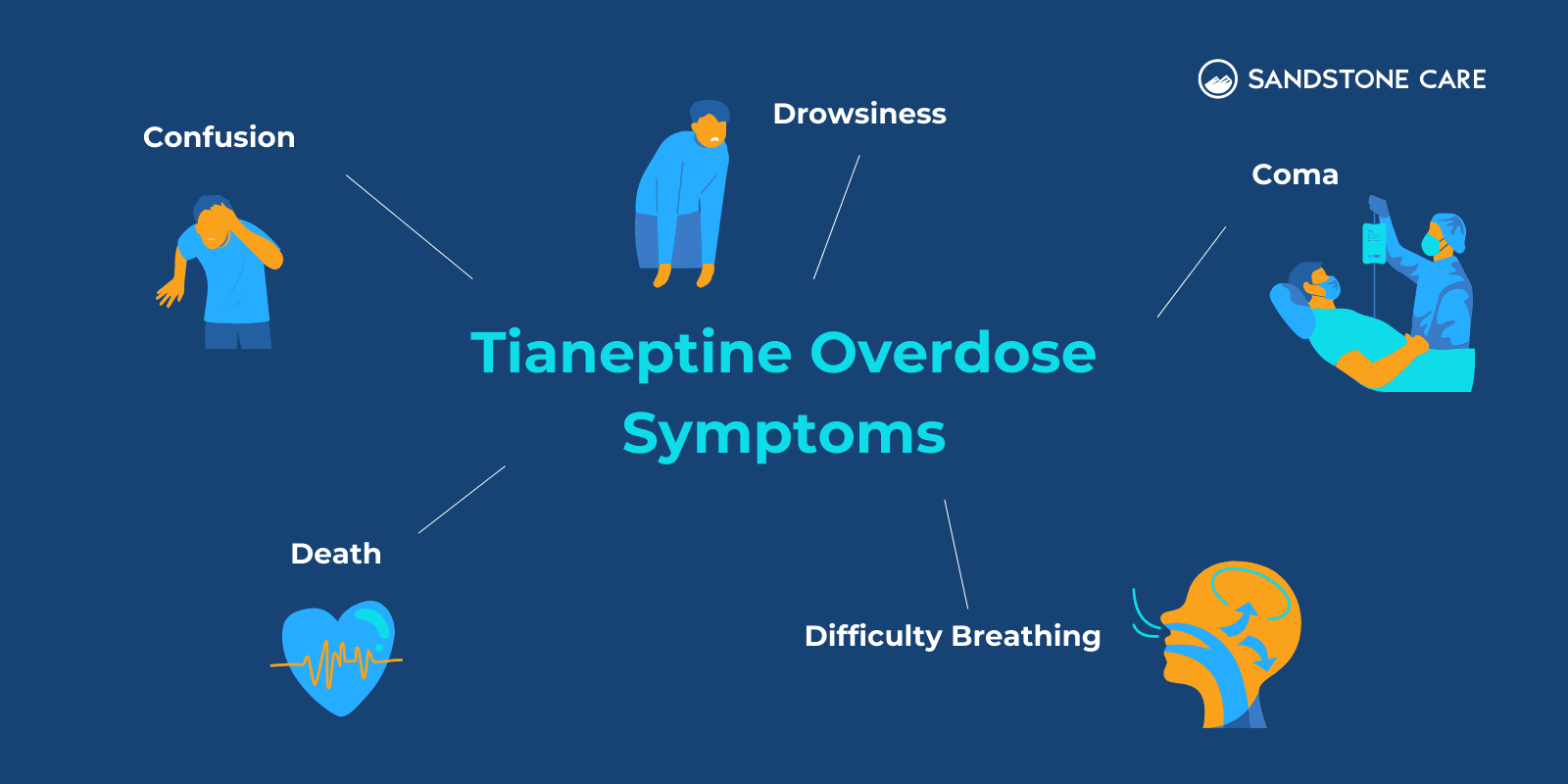
According to a study from Drug Metabolism & Disposition, after a week, about 66% of the drug is eliminated through renal excretion.
However, the time it takes for tianeptine to get out of your system can depend on various factors, such as how high of a dosage is taken, how often the drug is taken, your age, weight, and a number of different factors.
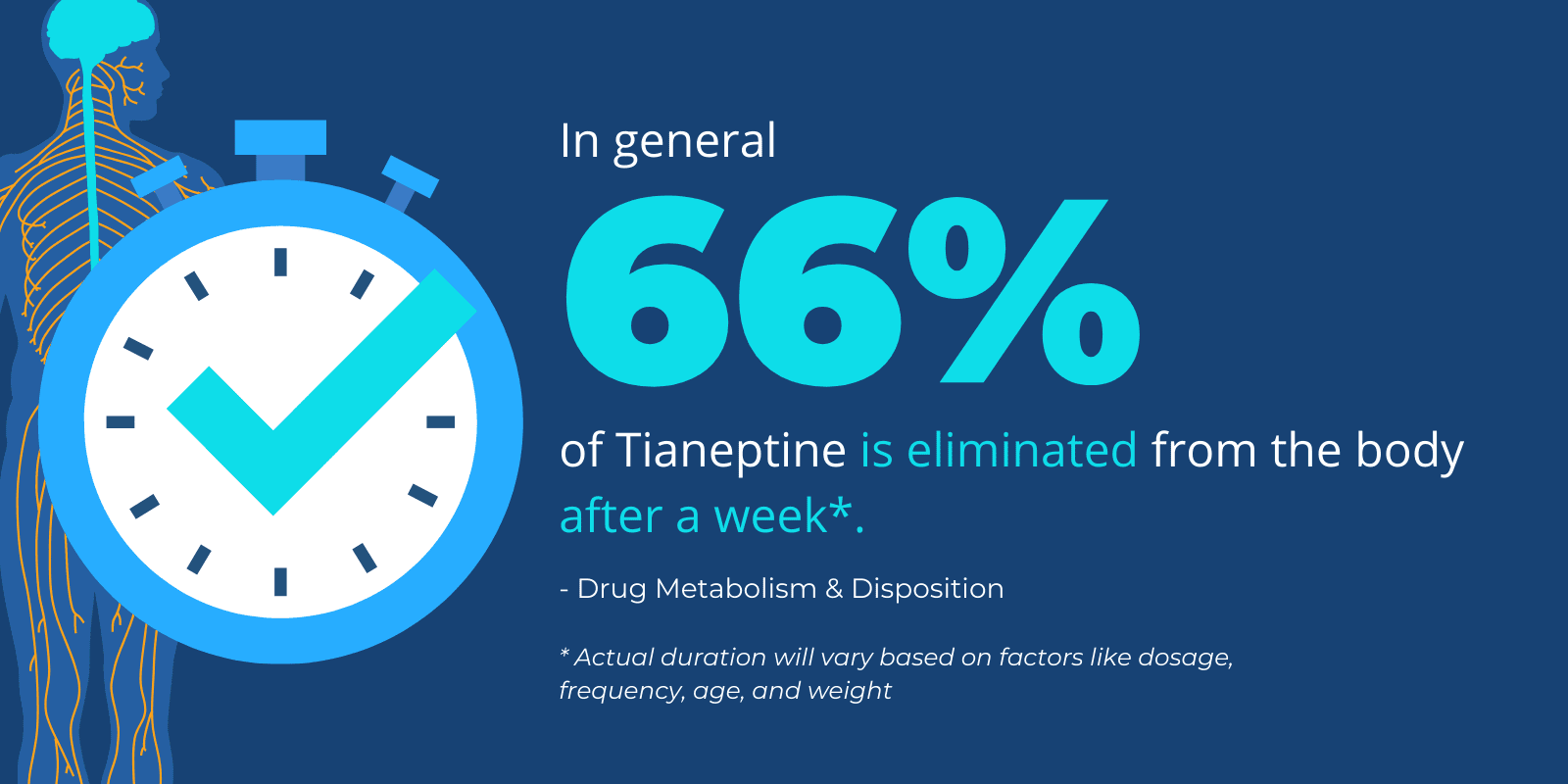
Some people report experiencing symptoms that are similar to opioid withdrawal when they are going through a tianeptine withdrawal.
These symptoms can include:
You should always consult with a doctor first before you plan on stopping or reducing a medication, including tianeptine.
Detox of tianeptine should be done in a medically-supervised environment to help safely manage withdrawal symptoms.
A medical professional can help a person taper off the drug or slowly reduce use over time to manage symptoms safely and with supervision.
Tianeptine treatment typically begins with detox.
It is important to get medical supervision when detoxing from tianeptine to help safely manage withdrawal symptoms.
A person may receive treatment for tianeptine addiction in a residential treatment center, inpatient, or outpatient programs, depending on what plan works best for their needs.
Tianeptine treatment aims to help individuals identify unhealthy patterns, learn and implement ways to change and restructure them, and safely manage effects and withdrawal symptoms.
Treatment for tianeptine addiction can be very different for each individual but often involves psychotherapy and/or medication.
It is important to find a treatment program that works best for you and your needs.
Treatment for tianeptine addiction can include both medication and some form of psychotherapy.
Cognitive behavioral therapy (CBT) is a commonly used form of psychotherapy used to treat various mental health and substance use disorders.
Through talk therapies like CBT, an individual can learn to identify negative thoughts, feelings, and behaviors and ways to restructure them in order to cope healthily.
The best treatment for tianeptine addiction depends on the individual’s needs.
For example, if a person has a severe substance use disorder and poses a risk to their safety and the safety of others, they may benefit from residential or inpatient care, where they receive a high level of structure, care, supervision, and support.
On the other hand, if someone is at a different point in their recovery journey and needs a little more flexibility and has a strong support system at home, they may benefit more from outpatient treatment.
Talking to your healthcare provider, treatment team, and support system can help you figure out what may be the best fit for you.
FAQ
Our goal is to provide the most helpful information. Please reach out to us if you have any additional questions. We are here to help in any way we can.
Tianeptine is banned in numerous states, including Alabama, Michigan, Mississippi, Tennessee, Georgia, Indiana, and Ohio.
Kratom is an herbal substance that produces effects similar to those of opioids and stimulants.
Both Kratom and Tianeptine are not approved by the FDA and pose a serious risk to individuals’ health and safety. Both can lead to substance abuse, dependence, addiction, and withdrawal.
Kratom is a tree that is native to Southeast Asia, and consuming its leaves can produce both stimulant and sedative effects.
When taken in low doses, Kratom can make a person feel increased energy, alertness, and talkativeness. Taken in high doses, Kratom can produce sedative effects.
In contrast to tianeptine, Kratom use has also been associated with psychotic symptoms, such as confusion, delusions, and hallucinations.
Additionally, Kratom is an herbal substance, whereas tianeptine is a synthetic drug.
While Kratom and tianeptine are both dangerous substances, they do have different effects on the brain and body.
Many who take tianeptine as a medication outside of the U.S. use it as an antidepressant to help improve one’s mood and manage the symptoms of major depressive disorder.
Some studies show that tianeptine can cause an increase in dopamine levels in certain areas of the brain.
Dopamine is a type of neurotransmitter that plays an important role in functions like reward, satisfaction, pleasure, and motivation.
Many antidepressants work by increasing dopamine or serotonin levels in an effort to improve mood. However, alterations in dopamine levels can also lead to negative effects like addiction.
Tianeptine is often marketed as a supplement that can increase your focus, improve your mood, and act as an energy enhancer.
However, the effects of tianeptine are often much more dangerous and come with serious risks.
Tianeptine can affect different chemicals in the brain.
When used in low doses, it can affect a person’s mood, and taking tianeptine in high doses can lead to opioid-like effects in the brain. `
Tianeptine use can also lead to tolerance, where a person’s brain and body becomes so used to the altered chemical levels from a substance that the effect of the drug decreases. They then need more and more Tianeptine to produce the same desired effects.
A tolerance of tianeptine can quickly develop into a dependence, where a person will experience withdrawal symptoms if they stop taking tianeptine or quickly reduce their use.
Tianeptine addiction happens when a person loses their ability to control their substance use, despite the negative effects it has on their life, health, and well-being.
If you or a loved one are facing challenges with tianeptine use or addiction, know that you are not alone. Do not hesitate to reach out for professional help.


Tianeptine has been associated with serious harmful effects including addiction, overdose, and in some cases, fatality. Sandstone Care is here to support teens and young adults with mental health and substance use disorders.